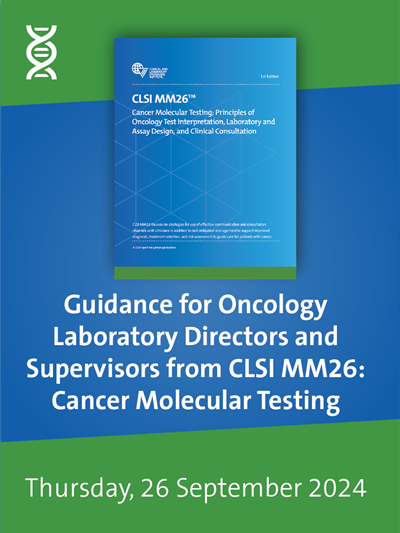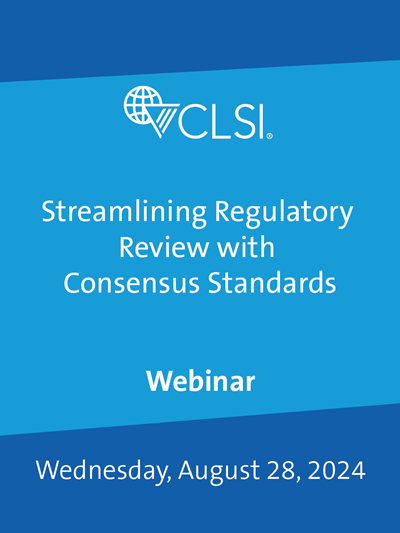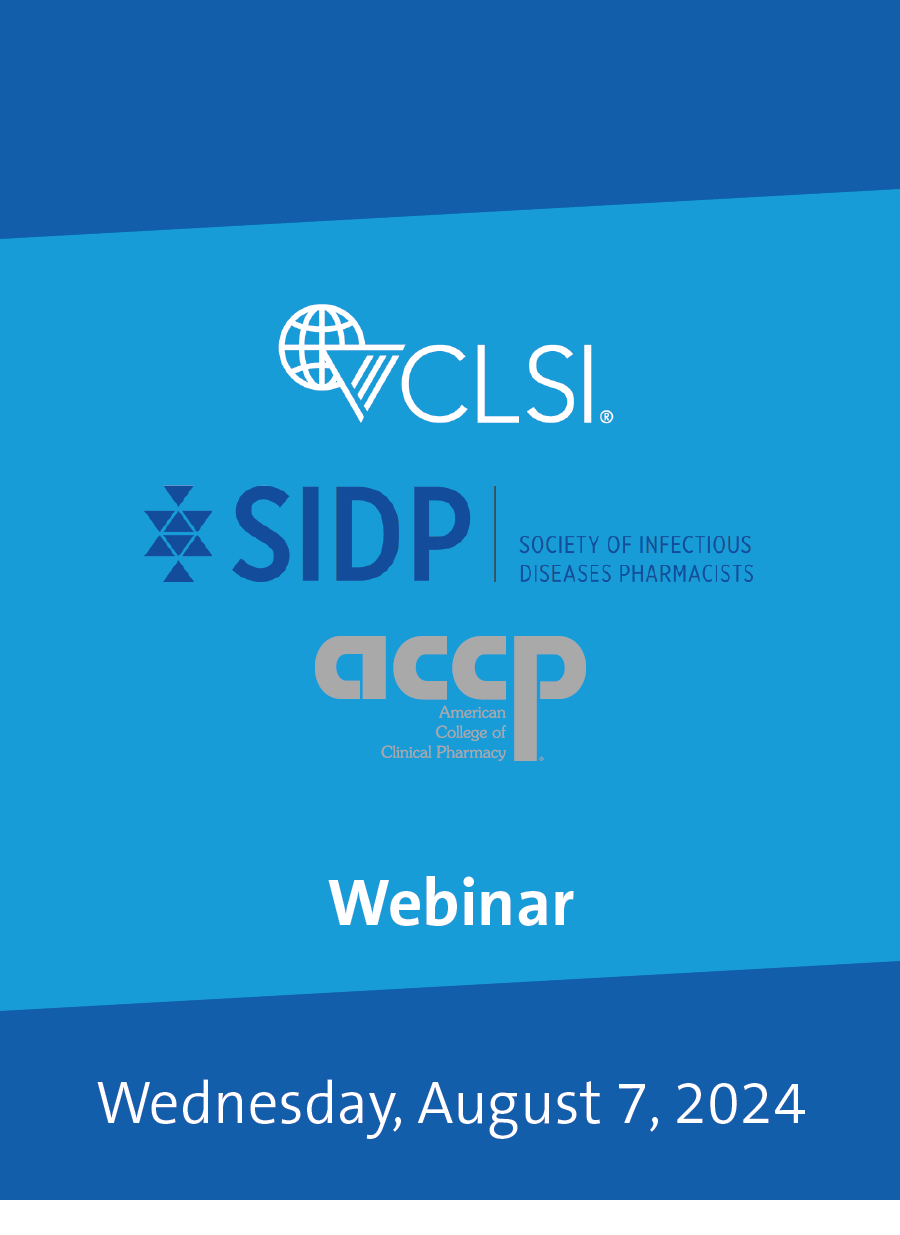
Catalog Advanced Search
-
Contains 1 Component(s) Includes a Live Web Event on 02/26/2025 at 1:00 PM (EST)
Join CLSI on Wednesday, February 26 at 1:00 ET for a webinar on the latest in Antimicrobial Susceptibility Testing (AST) with the release of the 35th edition of the CLSI M100 document.
Date: Wednesday, 26 February at 1:00-2:30 ET
Join CLSI on Wednesday, February 26 at 1:00 ET for a webinar on the latest in Antimicrobial Susceptibility Testing (AST) with the release of CLSI M100 Ed35. Receive the latest guidance for implementing new breakpoints and standards into your laboratory practices, including discussion of the major changes in this edition, including:
- A significant addition of a new appendix
- Expanded QC guidance
- Removal of breakpoint
- A new categorization of disk diffusion methods described in CLSI M02.
Moderator:
Janet Hindler, MCLS, MT(ASCP), F(AAM)
Clinical Microbiologist, Los Angeles County Department of Public HealthSpeakers:
April Bobenchik, PhD, D(ABMM)
Medical Director Microbiology and Associate Professor, Penn State Health and College of Medicine
Romney Humphries, PhD D(ABMM)
Professor, Department of Pathology, Microbiology and Immunology,
Vanderbilt University Medical CenterRegister for the webinar to watch live on 26 February 2025, or watch the webinar on-demand anytime. The on-demand recording will be available on 28 February 2025.
Earn up to 1.5 P.A.C.E. CE credits.
Learning Objectives:
1. Identify the major changes found in the updated 35th edition of the CLSI M100 document.
2. Design a strategy for implementing the new standard into laboratory practices.
3. Develop a communication strategy for informing clinical staff of significant AST and reporting changesLevel of Instruction: Intermediate
Refresher course; Some basic knowledge required; For the experienced staff technologist with some years of experience.CLSI is approved as a provider of continuing education programs in the clinical laboratory sciences by the ASCLS P.A.C.E.® Program.
-
Contains 13 Component(s), Includes Credits Includes a Live Web Event on 02/04/2025 at 1:00 PM (EST)
Join CLSI for a webinar series dedicated to the stages of FDA's Final Rule on Laboratory Developed Tests (LDTs) that will provide practical guidance, resources, and vital information for laboratories.
Join CLSI for a webinar series dedicated to the stages of FDA's Final Rule on Laboratory Developed Tests (LDTs). Register now for all webinars and receive access to the entire series that will provide practical guidance, resources, and vital information for laboratories. Once you are registered for the series, you will receive notifications about new webinars that are released, all on-demand recordings, and webinar slides. CLSI will update this series frequently with new webinar dates, topics, and other LDT resources.
The third webinar is a discussion around navigating design controls for FDA's Final Rule on LDTs, including resources for your laboratory to implement into practice. The webinar will include guidance for implementing design controls, a highlight of useful resources, and a Q&A discussion.
Webinar 3 | Tuesday February 4, 1:00 PM ET | Navigating Design Controls for LDTs
Introduction | Shannon Bennett, MS
Design Control Fundamentals for LDTs |
Q&A Discussion | Moderated by Michelle Campbell MS, MLS(ASCP)MB,SCWebinar 3 Learning Objectives
- Describe three steps you can take to prepare for establishing design controls.
- Identify two resources that your laboratory can utilize for design controls.
The second webinar is an overview and guide to of Stage 1 of FDA's Final Rule on LDTs, including resources for your laboratory to implement into practice. The webinar will include guidance for implementing stage 1, an overview of useful CLSI documents, and a Q&A discussion.
Webinar 2 | Wednesday, October 30, 1:00 PM ET | Standards to Prepare for Stage 1 Requirements
Introduction and Updates to the FDA's Final Rule on LDTs | Shannon Bennett, MS
Guidance for Stage 1 | Christopher Dailey, PhD
Overview of QMS11 and QMS18 | Lucia Berte
Q&A Discussion | Moderated by Shannon Bennett, Featuring Michelle Campbell MS, MLS(ASCP)MB,SCWebinar 2 Learning Objectives
- Describe three steps you can take to prepare for stage 1 of FDA's final rule regarding LDTs.
- Identify two resources that your laboratory can use to prepare for stage 1.
Webinar 1 | Thursday, August 15, 1:00 PM ET | An Overview of FDA's Final Rule on LDTs
The first webinar is a panel discussion and overview of the FDA's Final Rule on LDTs, including practical resources for your laboratory to implement into practice.
Webinar 1 | Webinar AgendaOverview of the Ruling | Shannon Bennett, MS, MBA, CMQOE(ASQ)
Q&A Discussion | Michelle Campbell MS, MLS(ASCP)MB, SC; Jonathan Genzen, MD, PhD, MBA; Shannon Bennett, MS, MBA, CMQOE(ASQ)
Method Navigator as a LDT Resource | Tabitha Kern, MS, MLS(ASCP)
Webinar 1 Learning Objectives- Describe three main takeaways from the FDA's Final Rule on Laboratory Developed Tests (LDTs).
- Identify two resources that your laboratory can use to prepare for the ruling.
Earn 3.0 P.A.C.E. credits for the first three webinarsUpcoming Webinars
Webinar 4 | TBD, Spring 2025
CLSI is approved as a provider of continuing education programs in the clinical laboratory sciences by the ASCLS P.A.C.E.® Program.
-
Contains 4 Component(s), Includes Credits
Join CLSI and CAP for a webinar discussing the clinical relevance of Staphylococcus species other than Staphylococcus aureus (SoSA).
Thursday, 5 December 2024 | 1:00 – 2:00 PM ET
Learning Objectives
- Discuss the clinical relevance of Staphylococcus species other than Staphylococcus aureus (SoSA).
- Describe issues surrounding detection of mecA-mediated beta-lactam resistance in SoSA.
- Explain situations for which species level identification of SoSA is suggested.
Speakers
Lars Westblade, PhD, Associate Director of our Clinical Microbiology Laboratory, Weill Cornell Medicine
Jennifer Dien Bard, PhD, D(ABMM), F(CCM), Director of the Clinical Microbiology and Virology Laboratory, Children’s Hospital Los Angeles
Earn 1.0 P.A.C.E.® credits for this webinar.
CLSI is approved as a provider of continuing education programs in the clinical laboratory sciences by the ASCLS P.A.C.E.® Program.
-
Contains 6 Component(s), Includes Credits
Participate in CLSI's webinar to gain knowledge on the latest method evaluation guidelines, get a sneak peek of EP47, and engage in a Q&A session addressing important topics in the industry.
Participate in CLSI's webinar to gain knowledge on the latest method evaluation standards, review newly published EP47, and engage in a Q&A session addressing important topics in the industry.
Tuesday, November 12, 2024, 1:00 PM ET
Agenda
Introduction | Tabby Kern, MS, MLS(ASCP)CM and Mark Kellogg, PhD, MT(ASCP), DABCC
Framework of EP | Paula Ladwig, MS, MLS(ASCP)
Overview of EP10: Preliminary Evaluation of Quantitative Medical Laboratory Measurement Procedures| Michelle Campbell, MS, MLS(ASCP)CMMBCM, SCCM
Preview of EP47: Evaluation of Reagent Carryover | Marvin Berman, PhD
Q&A Discussion | Mark Kellogg, MT(ASCP), DABCC, ModeratorLearning Objectives
1. Review the Test Life Phases Model and framework for evaluation protocol documents to establish and implement commercially manufactured or laboratory-developed test methods.
2. Identify an improvement within your laboratories's experimental design and data analysis procedure.
3. Examine criteria for planning, performing, evaluating, and documenting reagent carryover experiments.Earn 1.0 P.A.C.E. Credits.
CLSI is approved as a provider of continuing education programs in the clinical laboratory sciences by the ASCLS P.A.C.E.® Program.
-
Contains 6 Component(s), Includes Credits
This on-demand webinar includes including practical resources for your laboratory to implement FDA's Final Rule on LDTs, focussing on Stage 1 of the requirements.
Agenda
Introduction and General Updates | Shannon Bennett, MS, MBA, CMQOE(ASQ)
Guidance for Stage 1 | Christopher Dailey, PhD
Two Important CLSI Guidelines for LDTs: QMS11 and QMS18 | Lucia Berte, MA, MT(ASCP)SBB,DLM,CQA(ASQ)CMQ/OE
Panel Discussion
Learning Objectives
- Describe three steps you can take to prepare for stage 1 of the FDA's Final Rule on Laboratory Developed Tests (LDTs).
- Identify two resources that your laboratory can use to prepare for stage 1 of the ruling.
Earn 1.0 P.A.C.E. credits for this on-demand webinar.
CLSI is approved as a provider of continuing education programs in the clinical laboratory sciences by the ASCLS P.A.C.E.® Program.
- Describe three steps you can take to prepare for stage 1 of the FDA's Final Rule on Laboratory Developed Tests (LDTs).
-
Contains 7 Component(s), Includes Credits
Join CLSI for a webinar on how to build a cancer testing program and how to maintain and improve a cancer genomics laboratory. Our distinguished speakers will also discuss oncology test interpretation, clinical consultation, and new frontiers in testing.
Join CLSI for a webinar on the newly published MM26 Cancer Molecular Testing: Principles of Oncology Test Interpretation, Laboratory and Assay Design, and Clinical Consultation. Learn how to build a cancer testing program and how to maintain and improve a cancer genomics laboratory. Our distinguished speakers will also discuss oncology test interpretation, clinical consultation, and new frontiers in testing. A live Q&A will be available for all of your questions about the CLSI MM26.
Agenda
- Oncology Test Interpretation and Clinical Consultation | Rong He, MD
- Building and Growing a Cancer Testing Program | Sertac Kip, MD, PhD
- Maintaining and Improving a Cancer Genomics Laboratory and New Frontiers in Testing | Dan Jones, MD, PhD
- Q&A Discussion | Honey Reddi, PhD, Moderator
Earn 1.25 P.A.C.E.®️ credits. The on-demand recording for this webinar will be available on October 1.
Learning Objectives
- Appraise the knowledge base required of Molecular Oncology Laboratory Directors for optimal report interpretations and effective communication with clinical stakeholders (oncologists, genetic counselors, other providers).
- Review the elements of building a successful and high-performing laboratory facility and testing and bioinformatics teams to support complex molecular oncology assays.
- Identify best practices for sustainable lab quality and techniques to expand the reach and impact of your molecular oncology laboratory.
CLSI is approved as a provider of continuing education programs in the clinical laboratory sciences by the ASCLS P.A.C.E.® Program.
-
Contains 9 Component(s), Includes Credits
This session provides attendees with an understanding of how to use consensus standards as an indispensable tool for reducing the complexity of regulatory approval and clearance submissions.
The appropriate use of consensus standards can greatly streamline FDA medical device submissions and reduce the burden for the conformity assessment elements. With appropriate use of FDA-recognized consensus standards, developers of devices and LDTs can submit declarations of conformity (DOC) to meet some premarket requirements and reduce the amount of supporting data and information that are submitted to FDA. This webinar will feature a live Q&A discussion.
Speakers from each area will each present information on development and/or use of standards from their perspective:
- Clinical and Laboratory Standards Institute (CLSI), for standards development process and standards available to industry.
- FDA, for the appropriate use of standards.
- Abbott, for the industry perspective on participation in standards development.
Wednesday, August 28, 2024 | 1:00 PM ET
Earn 1.0 P.A.C.E.®️ credits.
Learning Objectives:
- Identify how the use of FDA-Recognized Standards can reduce the documentation burden of regulatory submissions.
- Determine how to use consensus standards effectively, including the submission of a Declaration of Conformity to the FDA.
- Summarize how participation in standards development is essential to ensuring that consensus standards incorporate regulatory needs.
Agenda
Introduction and CLSI’s Standards Development Process, Barb Jones, PhDFDA-Recognized Standards and Declaration of Conformity, Terry Woods, PhD
Participation in Standards Development, Vicki Petrides, MS
Q&A Discussion | All Panelists, Moderated by Barb Jones, PhD
CLSI is approved as a provider of continuing education programs in the clinical laboratory sciences by the ASCLS P.A.C.E.® Program. -
Contains 6 Component(s), Includes Credits
This on-demand first webinar is a panel discussion and overview of the FDA's Final Rule on LDTs, including practical resources for your laboratory to implement into practice.
The first on-demand webinar is a panel discussion and overview of the FDA's Final Rule on LDTs, including practical resources for your laboratory to implement into practice.
Agenda
Overview of the Ruling | Shannon Bennett, MS, MBA, CMQOE(ASQ)
Q&A Discussion | Michelle Campbell MS, MLS(ASCP)MB, SC; Jonathan Genzen, MD, PhD, MBA; Shannon Bennett, MS, MBA, CMQOE(ASQ)
Method Navigator as a LDT Resource | Tabitha Kern, MS, MLS(ASCP)
Earn 1.0 P.A.C.E. credits for the first webinar.
Learning Objectives
- Describe three main takeaways from the FDA's Final Rule on Laboratory Developed Tests (LDTs).
- Identify two resources that your laboratory can use to prepare for the ruling.
CLSI is approved as a provider of continuing education programs in the clinical laboratory sciences by the ASCLS P.A.C.E.® Program.
-
Contains 8 Component(s), Includes Credits
This annual webinar provides updates on the latest breakpoint recommendations from CLSI and offers practical strategies on incorporating those changes into clinical practice.
This annual webinar is a collaboration between CLSI, Society of Infectious Disease Pharamcists (SIDP), and the American College of Clinical Pharmists (ACCP). It will provide updates on the latest breakpoint recommendations from CLSI from M100 | Performance Standards for Antimicrobial Susceptibility Testing, 34th Edition, and offers practical strategies on incorporating those changes into clinical practice. Speakers will address the importance of partnerships between pharmacists and laboratory professionals on effective implementation of updates to enhance clinical practice. Audience polling will be included throughout, with an opportunity for Q&A at the end.
CLSI members can register for free by signing into their CLSI account. Society of Infectious Disease Pharamcists SIDP and ACCP ID PRN members, please register on SIDP's website.
Live Date: Wednesday, August 7, 2024
1:00 PM – 2:30 PM ET / 12:00 PM – 1:30 PM CTEarn 1.5 P.A.C.E.®️ credits.
Target Audience:
This activity was planned to meet the educational needs of Pharmacists and Laboratory Professionals.Learning Objectives:
· Summarize highlights from the M100—Performance Standards for Antimicrobial Susceptibility Testing, 34th Edition standards for antimicrobial susceptibility testing and reporting
· Examine nuances that may be encountered when performing antimicrobial susceptibility testing (AST) for carbapenem-resistant bacteria.
· Evaluate species-specific guidance for AST of Staphylococcus sp. and ceftriaxone dosing guidance for methicillin-susceptible Staphylococcus aureus
· Discuss the revised breakpoints, reporting, and treatment recommendations for Stenotrophomonas maltophilia
Clinical and Laboratory Standards Institute is approved as a provider of continuing education programs in the clinical laboratory sciences by the ASCLS P.A.C.E. Program.
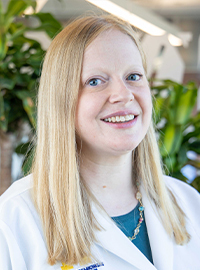
Virginia M. Pierce, MD, FIDSA
Clinical Associate Professor of Pathology and Pediatrics (Pediatric Infectious Diseases)
University of Michigan Medical School
Dr. Pierce (faculty) has no financial relationships with an ineligible company to disclose.

Navaneeth Narayanan, PharmD, MPH, BCIDP
Clinical Associate Professor
Rutgers University
Dr. Narayanan (faculty): Research funding from Merck and Shionogi; Consultant, Advisor, Speaker
-
Contains 7 Component(s), Includes Credits
Explore the challenges and successes of using beta-lactam combination agents from three different perspectives, including the pharmaceutical industry, the laboratory, and clinical practice.
Please register for this course to claim P.A.C.E. credits from the June Education Session and access the on-demand recording.
Explore the challenges and successes of using beta-lactam combination agents from three different perspectives, including the pharmaceutical industry, the laboratory, and clinical practice. This session will delve into the development process of beta-lactam combination agents and laboratory requests and QC issues. The successes and failures of using beta-lactam combination agents in clinical practice will also be discussed.
Learning Objectives
- Describe the process in development of beta-lactam combination agents.
- Recognize requests that laboratories receive for testing these agents.
- Identify challenges laboratories face with QC issues when testing beta-lactam combination agents.
- Summarize the success and failures of using beta-lactam combination agents in clinical practice.
Clinical and Laboratory Standards Institute is approved as a provider of continuing education programs in the clinical laboratory sciences by the ASCLS P.A.C.E. Program.

Romney Humphries, PhD D(ABMM)
Professor, Department of Pathology, Microbiology and Immunology
Vanderbilt University Medical Center
Romney Humphries, PhD D(ABMM) is a Professor in the Department of Pathology, Microbiology and Immunology at Vanderbilt University Medical Center, where she is the Director of Infectious Diseases Laboratories and the Director of the Division of Laboratory Medicine. Romney received her PhD in bacteriology from the University of Calgary, Canada and a clinical and public health microbiology CPEP fellowship at UCLA.
Dr. Humphries is passionate about clinical microbiology and antimicrobial resistance in particular. She is a champion for the development of novel diagnostic tests for infectious diseases to transform how patients with infections are managed.

Greg Moeck, PhD
Senior Vice President, Microbiology
Venatorx Pharmaceuticals, Inc.
Dr. Moeck is Senior Vice President, Microbiology at Venatorx Pharmaceuticals where he is responsible for ensuring comprehensive and timely characterization of investigational agents via clinical microbiology studies. He has spent over 15 years in antibacterial drug discovery and development, leading cross-functional teams or as a team member advancing the long-acting lipoglycopeptide oritavancin through nonclinical IND-enabling studies. Dr. Moeck has published over 50 papers in peer-reviewed journals, co-authored three book chapters, and is co-inventor on four patents relating to methods of treatment of bacterial infections.
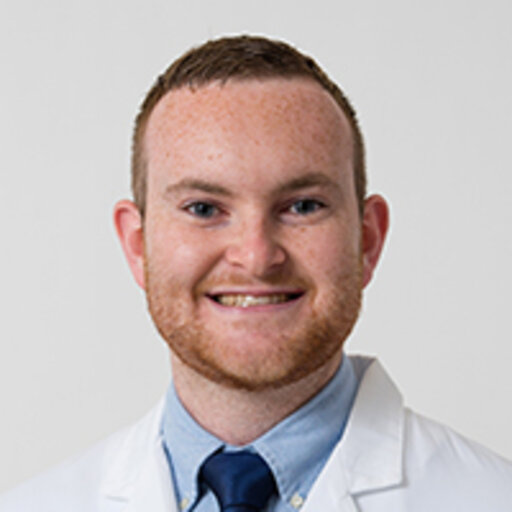
Andrew Fratoni, PharmD
Associate Director, Clinical and Laboratory Studies
Hartford Hospital
Dr. Fratoni is the Associate Director of Clinical and Laboratory Studies at Hartford Hospital in Hartford, CT.

